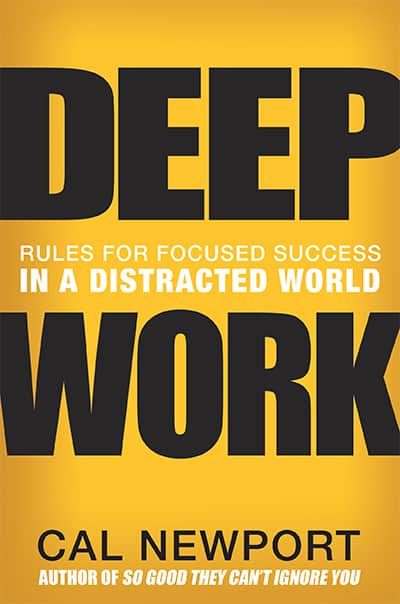I just wanted to share a few thoughts that have been on my mind recently with regards to writing. Actually, it all started as I was reading Cal Newport’s latest book, Deep Work: Rules for focused success in a distracted world.

Many of us are well aware of the growing problem of distraction, not only in the workplace, but in a life riddled with push notifications, instant messaging and tiny doses of dopamine in the form of “likes”, “shares” and “retweets”.
In the book, Newport introduces the idea of Deep Work as:
“The ability to focus without distraction on a cognitively-demanding task”
– Cal Newport
While that might seem like common sense at first, Newport goes much further into this concept and highlights what can be seen as both a problem and an opportunity in industry:
The ability of humans to do ‘deep work’ is becoming both more scarce and more valuable as a career skill.
In other words, individuals can leverage the ability to intently focus and produce — and also make themselves incredibly valuable to businesses by nurturing this ability. In many areas and professions, those few people with a grasp on deep work and an ability to reliably DO deep work on a regular basis will rise to the top of the professional food chain at a rapid rate, given the fundamentally higher quality and faster pace of their work.
Enter: Content Marketing
This got me thinking about how the responsibilities of a Content Manager fit into these definitions of “Deep” work, and its arch-nemesis rival, “Shallow” work:
- Writing original, useful content is deep work
- Forming new ideas for content is deep work
- Developing a content strategy is deep work
And conversely:
- Content promotion is shallow work
- Partaking in industry discussion on social media is shallow work
- Scheduling interviews & guest posts is shallow work
- Copy editing is shallow work
- Re-purposing content is shallow work
Writing is, by all accounts, a “deep work” operation
I don’t think many people would argue with the suggestion that good, research-based, long-form writing requires deep work in order to be valuable. Generating new ideas, structuring arguments and conveying such arguments through words is a process that demands minimal distraction and a reasonably high proportion of the human brain’s capacity in order to be successful.
Social-media-based work is the opposite
Social media interaction is used in Newport’s book as a prime example of ‘light work’ — something that does not require long-term focus and attention. In fact, it’s argued to be one of the main causes of the rapid decline of our ability to focus over the last decade. Every time an interaction takes place, such as replying to an incoming Tweet or sharing a news update, our brains are being trained to take the “easy path”, focusing on small rewards gained through little effort.
Herein lies the problem
The problem here is clear: These are two responsibilities undertaken by many Content Managers in businesses today. We expect people to juggle between a task that requires the utmost focus and attention over an extended period of time, and something that’s built around tiny, interrupting interactions that cannot easily be scheduled or batched together.
In assigning these two responsibilities to your Content Manager, you could be destroying their capability to do deep work — to research and write the great content that your business needs to grow.
We already have a problem with a flood of unoriginal, regurgitated content which you could argue is a byproduct of applying shallow work to the process of writing. How do we avoid this downward spiral and leverage the benefits of deep work that Cal mentions above?
Is this an individual’s problem, or a business problem?
Clearly, both aspects of a the Content Manager’s role are a requirement in today’s industry. If you spend time writing great, original content but don’t put any effort into promotion, you won’t see results. We need to do both of these things.
So what can we do to mitigate this problem?
Content Managers:
- Make your manager and team aware of the concept of deep work, and the conditions that in-depth writing requires.
- If you really do have to handle social media AND deep writing, think about whether you can batch these tasks into specific days.
- Automate as much as possible on the social side to remove distraction.
- Set aside time to do deep work. During this time, negotiate that it’s acceptable to be offline from Slack, or unreachable by email — whatever it takes.
Founders & Marketing Managers:
- Understand that the responsibilities mentioned above are effectively incompatible with each other.
- Consider hiring a social media manager to handle your business’s social presence, including the sharing and promotion of content — avoid pushing this task around your whole team!
- Encourage Content Managers to find their own way to get into the ‘zone’ for doing deep work on content. If that means working remotely, quitting Slack and email for a day or any other more-drastic measures, then at least be open to the idea.
In summary: Business leaders should understand that the ability of their content team to shut themselves away and switch off from social media is critical to the operation of writing industry-leading, original content. The kind of content that differentiates their business from the sea of noise that your team strives to stand out from every day.
